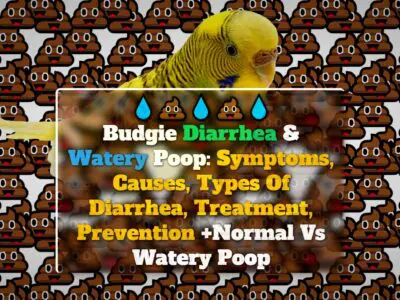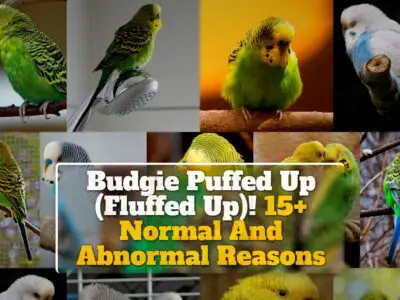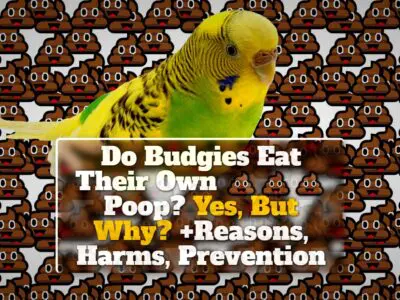Budgie panting can be due to normal reasons such as excitement, stress, physical exertion, or temperature regulation.
However, it can also indicate abnormal issues like respiratory problems, heart disease, allergies, heat stroke, or poisoning.
For new budgies, panting may occur as they adjust to a new environment.
I understand that certain budgie behaviors can be puzzling, and even worrying, especially for new owners.
One such behavior is panting.
To demystify this, I have penned down this detailed article.
From years of experience, and love for these tiny creatures, here’s everything you need to know about why your budgie is panting, how to distinguish between normal and abnormal panting, and the steps you can take to ensure their well-being.
What Is Panting In Budgies?
Panting in budgies refers to the phenomenon where these birds appear to breathe heavily, often with their beaks open.
Just like humans, budgies use panting as a mechanism to cope with certain situations.
However, it’s important to know the distinction between normal and abnormal panting.
Your budgie’s panting could be a response to natural events like excitement or heat, or it could be an indication of underlying health issues.
Normal Reasons For Budgie Panting:
Regulating Body Temperature
Budgies, like other birds, lack the sweat glands that mammals possess for regulating body temperature.
To compensate for this, they employ a technique called ‘gular fluttering’ or panting.
When a budgie feels overheated, it opens its mouth and starts to breathe rapidly.
This process increases air flow over the moist surfaces within the bird’s mouth and respiratory tract, leading to evaporation and subsequent cooling.
Think of it as a bird’s version of sweating.
So, if you see your budgie panting on a hot day or in a warm room, it’s likely trying to cool itself down.
Excitement Or Stress
Budgies can also pant in response to psychological stimuli such as excitement or stress.
When something exhilarates or frightens them, their heart rate and breathing might speed up, leading to panting.
For instance, the introduction of a new toy, another budgie, or a sudden environmental change can excite or stress them, triggering the panting response.
It’s important to observe the context in which the panting occurs.
If it’s brief and occurs during times of obvious excitement or stress, it’s generally nothing to worry about.
Molting
Molting, the process of shedding and regrowing feathers, can be a particularly stressful period for a budgie, and may result in panting.
During molting, your budgie is not just losing feathers but also growing new ones, which demands a substantial amount of energy.
This period might leave your budgie feeling unwell or uncomfortable, leading to increased respiration or panting.
It’s crucial to ensure your budgie is eating a nutrient-rich diet during this time to support the growth of healthy new feathers and minimize discomfort.
Physical Exertion
Just like humans, budgies can also pant after engaging in vigorous physical activities.
Physical exertion, such as prolonged periods of flying or playing, can lead to an increase in body temperature and heart rate, resulting in panting.
This type of panting should be temporary and should subside once the bird rests and its body cools down.
It’s essential to ensure your budgie has ample opportunity to rest and recover after bouts of strenuous activity.
Abnormal Reasons For Budgie Panting
Respiratory Infections
Respiratory infections are a common health problem in budgies that can lead to panting.
These infections can be caused by various pathogens, including bacteria, viruses, or fungi.
They can affect the bird’s airways, making it more difficult for the budgie to breathe.
In an attempt to get more oxygen, the budgie may start to pant.
Other symptoms can include nasal discharge, changes in vocalization, and a decrease in activity levels.
Heart Disease
Heart disease in budgies can lead to reduced oxygen circulation, which in turn, may result in panting.
Budgies with heart disease may have difficulty pumping blood effectively, leading to insufficient oxygen supply to the body.
This can cause the bird to breathe rapidly or pant in an attempt to increase oxygen intake.
Other potential signs of heart disease in budgies include lethargy, loss of appetite, and reduced ability to fly or exercise.
Allergies
Though less common than in humans, budgies can also suffer from allergies, which can lead to respiratory distress and consequently, panting.
An allergic reaction in budgies can be triggered by various substances in their environment, such as certain types of bedding, dust, mold, or even certain foods.
These allergens can cause inflammation in the bird’s respiratory tract, making it difficult for the bird to breathe and leading to symptoms like panting, sneezing, or nasal discharge.
Treatment may include anti-inflammatory or antihistamine medications to manage the symptoms.
Other Health Conditions:
Heat Stroke
Extreme heat can lead to heat stroke in budgies, causing symptoms like panting, weakness, and even unconsciousness.
Poisoning
Budgies can get poisoned if they ingest harmful substances or are exposed to toxic fumes.
Panting might be one of the signs of poisoning.
Obesity
Obese budgies might pant as a result of the extra effort required to move around.
Common Causes Of Budgie Panting
High Temperatures And Overheating
In environments with high temperatures, budgies can easily become overheated, leading to panting as they try to cool down.
These birds, native to the relatively moderate climate of Australia, aren’t naturally equipped to handle extreme heat.
If their environment becomes too hot, they may start to pant in an effort to lower their body temperature.
This can be exacerbated if there isn’t adequate shade or fresh water available.
If a budgie is exposed to high temperatures for too long, it can lead to heatstroke, which is a serious condition.
Hence, it’s important to monitor the temperature of your budgie’s environment, especially during summer months or in hot climates, and provide plenty of water and shaded areas.
Stress And Anxiety
Budgies can experience stress and anxiety, much like humans, and this can lead to panting.
A wide range of factors can cause stress in these birds, including sudden changes in their environment, introduction of new pets or people, loud noises, or even boredom.
When a budgie is stressed or anxious, its heart rate can increase, leading to panting.
Prolonged stress can have a detrimental effect on a budgie’s overall health and wellbeing, making it more susceptible to illness.
Therefore, it’s important to create a calm, stable environment for your budgie, provide mental and physical stimulation, and keep sudden changes to a minimum to help reduce stress and anxiety.
Illnesses And Infections
Various illnesses and infections can cause panting in budgies.
Respiratory infections, heart disease, and even metabolic diseases can make it difficult for a budgie to breathe, leading to panting.
These illnesses can cause inflammation, obstruction, or damage to the respiratory tract, or they can impact the bird’s overall energy levels and body functions.
Additionally, some infections can cause a fever, which can raise the budgie’s body temperature and result in panting.
Strenuous Exercise
Just as with humans, strenuous exercise can lead to an increased heart rate and rapid breathing or panting in budgies.
This can happen when budgies engage in vigorous activities such as extended periods of flying or high-energy play.
Panting helps the budgie’s body to cool down and return to its normal temperature post-exercise.
However, if your budgie continues to pant excessively long after exercising, it may be a sign of overexertion or an underlying health issue, such as heart disease or respiratory problems.
Obesity
Obesity is a serious health issue that can affect budgies, causing them to pant due to the extra effort required to carry excess weight.
Budgies who are overweight may struggle with physical activity, and they might breathe heavily or pant even after minimal exertion.
Additionally, excess weight can put a strain on a budgie’s organs, including the heart and lungs, making breathing more difficult.
Obesity in budgies can be caused by a diet too high in fat and sugars, coupled with a lack of physical activity.
Identifying Budgie Panting And Breathing Problems
Signs Of Respiratory Distress In Budgies:
Rapid Breathing
Rapid breathing might be a sign of respiratory distress in budgies.
Tail Bobbing
A budgie that is having trouble breathing might show a pronounced bobbing of its tail.
Open-mouth Breathing
This might be a sign that your budgie is struggling to get enough oxygen.
Signs Of Other Health Issues:
Lethargy
A budgie that is feeling unwell might be less active than usual.
Loss Of Appetite
If your budgie is not eating as much as it usually does, it might be feeling unwell.
Abnormal Vocalizations
Changes in the sounds that your budgie makes can be a sign that something is wrong.
How To Help A Panting Budgie
Providing A Calm And Comfortable Environment
Creating a calm and quiet environment for your budgie can help reduce stress and anxiety, which might be causing it to pant.
Regulating Temperature And Humidity
Maintaining a comfortable temperature and humidity level can prevent your budgie from overheating and panting.
Offering Fresh Water And A Balanced Diet
Proper hydration and nutrition can keep your budgie healthy and reduce the likelihood of panting due to illness or stress.
Minimizing Stressors And Fear Triggers
Removing things that might be causing stress or fear in your budgie can help reduce panting.
Consulting A Veterinarian
If your budgie continues to pant despite your best efforts, it might be best to consult a veterinarian.
Preventing Budgie Panting
Proper Budgie Care
Adopting proper care practices can ensure that your budgie stays healthy and less prone to panting.
Regular Veterinary Check-ups And Vaccinations
Regular vet visits and vaccinations can keep diseases at bay, reducing the likelihood of panting due to illness.
Maintaining A Clean And Safe Living Environment
Keeping your budgie’s living environment clean can prevent infections and diseases that might cause panting.
Providing Mental And Physical Stimulation
Keeping your budgie mentally and physically stimulated can ensure that it is healthy and happy, reducing the chances of panting due to stress or anxiety.
FAQs About Budgie Panting
Why Is My New Budgie Panting?
Your new budgie might be panting due to stress or anxiety related to its new environment.
Why Is My Budgie Puffed Up And Panting?
A budgie that is puffed up and panting might be feeling unwell.
It would be best to consult a veterinarian in this case.
Why Is My Baby Budgie Panting?
A baby budgie might pant due to stress, heat, or it could be a sign of an underlying health issue.
It’s best to consult a veterinarian if your baby budgie is panting.
How Can I Tell If My Budgie Is Panting Due To Excitement Or Stress?
If the panting occurs during or after a stimulating event such as playtime or a change in environment, it could be due to excitement or stress.
However, if it’s prolonged or accompanied by other symptoms, it might indicate a health problem.
How Can I Make Sure My Budgie’s Environment Is Helping To Prevent Panting?
Maintaining a comfortable temperature, providing fresh water and a balanced diet, ensuring a clean living environment, and minimizing stressors are key to creating an environment that helps prevent panting in your budgie.
Can A Change In Diet Cause My Budgie To Pant?
While a sudden change in diet might cause temporary stress leading to panting, a healthy, balanced diet should not cause panting.
If your budgie is panting persistently after a diet change, it’s advisable to consult a vet.
Are There Any Specific Breeds Of Budgies More Prone To Panting?
Panting in budgies is generally not breed-specific and can occur in any budgie due to various factors like temperature, stress, physical exertion, or health issues.
In addition, English budgies have a larger body than normal budgies.
It is often witnessed that English budgies are more panting after physical activities than normal birds.



